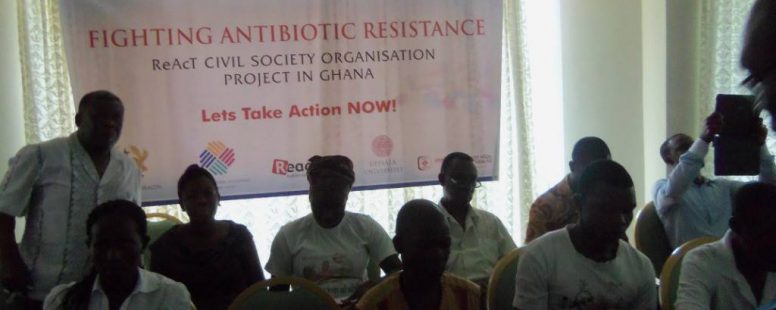Workshop “Fighting antibiotic resistance” at Winnaba
As part of our social responsibility on the 15th of July 2014, the Action Antibiotic Resistance Agency (AARA) organized a day workshop at Winneba on the topic, ̋ FIGHTING AGAINST ANTIBIOTIC RESISTANCE” to train thirty (30) personnel from different Civil Society Organizations (CSOs) in Health from Ghana, also to help educate and train groups leaders in our districts especially for venerable community members and thereby fighting against antibiotic resistance in the country with which Young and Lonely Foundation (YLF) was part of the participants.
This workshop was held mainly to:
- Improve the knowledge, attitudes, believes and practices of participants to fulfill the relevant roles of CSOs in accountable use of antibiotics in our communities.
- Increase the awareness of CSOs on antibiotic resistance and the responsible use of antibiotics in the communities.
- Dispel common myths and misconceptions among CSOs about the use of antibiotics.
- Provide the necessary materials to CSOs to set up the training among their constituents.
Build capacities of participants.
During the workshop the facilitators from AARA took us through microbial world, gave us some examples and their importance in the life of human beings. Under the microbial world George said, microbes or germs are tiny organisms which can only be seen with the help of a microscope. Microbes have the ability to reproduce by themselves. He gave examples of microbes as bacteria, virus, protozoa and fungus. He said microbes can cause a lot of diseases which includes chicken pox, diarrheal, meningitis etc.He added that, bacteria are named or determined by their shapes and these are Spiral shape, Round shape and Rod shape. He also gave their importance as being helpful for the processing of food, vitamin, for immunization and defense. Some of the bacteria he mentioned were Streptococcus Lactis (yoghurt bacteria), Bacillus Megatherium.
Virus was one of the examples George gave under microbes. Human Papilloma (virus that causes cervical cancer), Varicella Zoster (virus that causes chicken pox) and Influenza (virus that causes) were examples he gave under virus.The discussion also included issues relating to antibiotics, their importance, how and where to get them. We were given some pre-test questions to provide answers to them on antibiotics. They gave the definition for antibiotics as anything that fight against the lives of bacteria. They said, the term Antibiotic was coined by Selman Waksman in 1942 and since that time till now there has been no change but just some small improvement.
They said, antibiotics cannot cure diseases caused by viruses and in other for a person to know the kind of disease he or she is suffering from, he or she ought to see the doctor or health workers for the right diagnose and prescribed medication before using them, This is because; the medicines that cures one person cannot cure another just because they are suffering from the same disease. We should also note that; the choice of antibiotic depends on type of infection and the bacteria responsible.
The resistance of antibiotic is the ability of bacteria or other microbes to resist the effects of an antibiotic. This happens when the individuals turn to abuse the use of antibiotic. Some of the ways are:
- Self medication – some people go to the medical stores and buy any antibiotic for themselves without seeking any medical approval just because that same drug cured a friend, a family member.
- Sharing with others – some people also share the same antibiotic with others because they think they are suffering from the same illness and other too, it is due to financial difficulties.
- Using it on open sore – some people use antibiotics on open sores
- Use when not needed – some people use antibiotics even when they are not ill with the motive of prevention.
- Uses of antibiotics in herbal concoction – some people also mix antibiotics with herbal medicine especially those who buy from passengers vehicles (trotro).
- The resistance of antibiotics can be controlled and solved if we all learn how to take our medication to the bottom and not putting a stop to the taking of medication when we think we are well from our illness. Personal hygiene can also solve these problems of antibiotic resistance.





